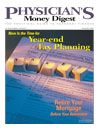The Effect of Frequent Trading on Investment Results
Dr. Odean and Dr. Barber from theUniversity of California have been examiningdata from investor householdssince the late 1980s. In one study, theyaccessed account data from 66,000households at a large discount brokeragefirm between 1991 and 1996. The purposewas to determine if the householdsthat traded the most actually benefitedfrom it. They found that the group thattraded the least earned 5% more than thegroup that traded the most. If this studyis taken over 2 years, the differencebetween the two groups is even moresignificant. This research indicates thatfrequent trading is not advantageous tothe individual investor, especially onewho may not be able to make sufficientlywise decisions to overcome the costs ofrecurrent trading.
Articles in this issue

Now is the time for year-end Tax Planning
Fee Vs Commission: Which Advisor Is Best?
Does Your Advisor Practice What They Preach?
Understand Your First Law of Investing
Learn to Debunk Some Myths of the S&P 500
Search for Good Value in Your Investments
Blame Human Nature for Impulsive Trading
Open Your Eyes to Secrecy and High Fees
The Effect of Frequent Trading on Investment Results
Capitalize on China's Great Opportunities
Do You Have a Solid Future in Investing?
Listen to a Seasoned Physician-investor
Close-up: Personal Financial Specialist
Value the Advantages of Growth Stocks
Investors Behaving Badly?
Related Content